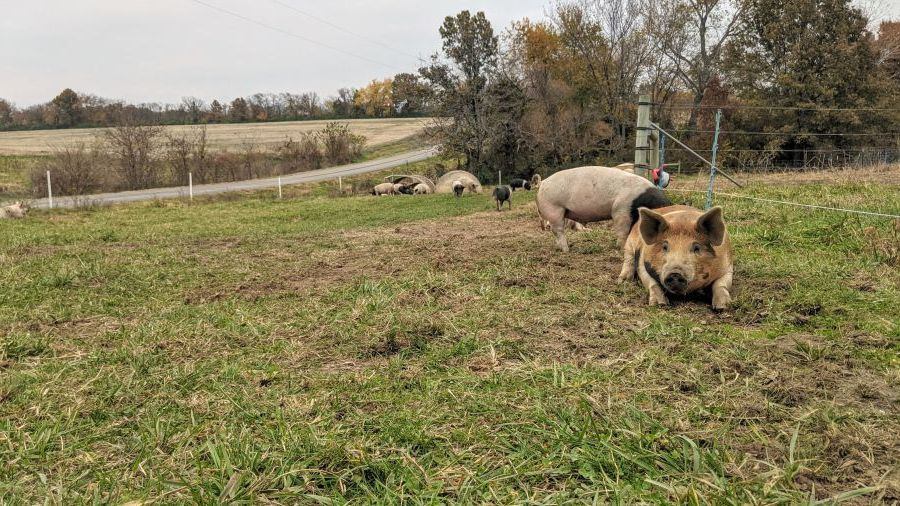How We Care for Our Hogs in the Winter
posted on
January 3, 2024
Hey guys! It's January...
We have officially entered winter, and the farm is mostly quiet. There are no poultry to listen to on the Kesten farm currently, just the grunt of hogs and the clamoring of their feeders. So this week I thought I'd show you how we keep them happy in the winter!
Not only do our hogs get the privilege of being cared for by such a handsome farmer, but hogs at David's Pasture get to enjoy being outdoors year-round.

These guys have zero issues with winter. They love it! Swine do not sweat like you and I, so they would rather take the cold over heat. They dig down to warm soil and sleep in a pile to share body heat. It reminds me of when the farmhouse would get cold growing up and my siblings and I would all pile into the same bed to stay warm lol. They also have a "hog hut" for an escape from the wind.

We put hay or straw in their paddock during the winter. This offers several benefits.
First, the pigs love it. It gives them something to bed in for additional warmth and serves as a toy. I often catch them chewing on it, piling it up, or throwing it with their snouts like confetti. They are great at hiding in it too.
The second benefit is for the soil! Whether in the pasture or a winter paddock, it provides beneficial ground cover during the cold months and then feeds the microbes when spring comes around. It's a win-win.


That's our stockpile of straw bales for this winter. This year we were able to get them all from a neighbor just down the road!
The pigs (younger swine) get straw for bedding in their winter paddock just like the bigger guys. They also get access to the barn for refuge from freezing windchills.

But how do they get water during freezing temps you ask? Well thanks to our friend, electricity, we can supply them with fresh water all day using tank heaters. We fill the waterers using short hoses that we remove and drain each time to keep them from freezing up. The hogs also get raw apple cider vinegar in their water as an immune booster.

We use these portable waterers in all four seasons. They are an easy way to get water to our swine friends wherever they are on the farm.
And that's how we keep our hogs happy even in the winter (when their farmers tend to be a little more moody. 😅) If you have a question about how we raise our hogs that I have not answered here, please comment below or contact us directly!
And if you are ready to try some of our delicious pasture-raised pork, click here to order yours today.
Have a wonderful week!
Your farmer,
Remi Kesten



